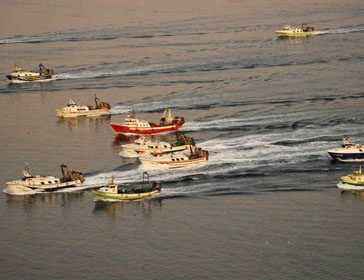Subsidies: Overview

For decades, EU fisheries subsidies have fuelled the growth of the EU fleet to a level estimated to be two to three times higher than what the ocean can sustainably provide and then artificially maintained the overcapacity of the fleet, driving the overfishing of our seas. Yet the vast majority of Europe’s fishing fleets is unprofitable and would not be able to operate without subsidies from Member States.
According to the World Bank and the FAO (“The Sunken Billion”, 2008), marine fishing loses US$50,000 million each year around the world, a figure that could turn into benefits if correct management measures were applied. Along the same lines, a scientific publication by Dr. Rainer Froese (“Rebuilding fish stocks no later than 2015: will Europe meet the deadline?”, 2010) shows that catches could increase by up to 80% if management were sustainable.
Oceana released a study in 2011 estimating the total expenditure in fishing sector subsidies in 2009 to have amounted to EUR 3.3 billion. This estimate is three times greater the amount that is typically quoted in public figures. In 13 countries, subsidies were greater than the value of the fish catch.
In 2013, Oceana released another study, this time looking at state aid, the hidden subsidies allocated by Member States to their fleets between 2000 and 2013. The estimate totaled up to EUR 4,9 billion, of which only 1% was identified by Oceana as beneficial subsidies for the marine environment.
Oceana is calling on the EU to put an end to the vicious circle of overcapacity and overfishing of the fleet. The European Union should stop environmentally harmful and capacity-enhancing subsidies and support financially the protection of marine environment through the creation of marine protected areas, the increase of fisheries control and the scientific research.
Scientific Community calls on the Members of the European Parliament to stop funding overfishing
Shifting subsidies to environmentally beneficial measures (PDF)

